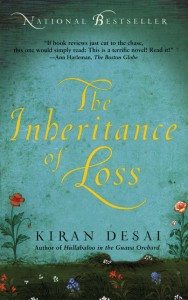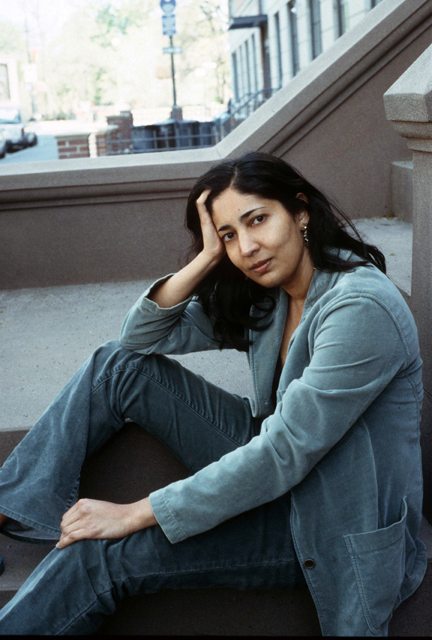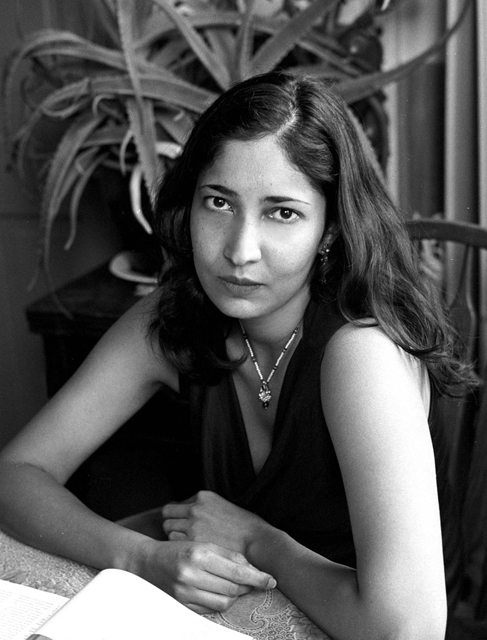Kiran Desai & Anita Desai
“This book was written almost entirely in her company, along with of course, you know, her writing wisdom and growing up in a house full of her books and learning how to live the writing life alongside her,” said Kiran Desai in a radio interview after winning the prestigious Man Booker award for her novel, ‘The Inheritance of Loss.’
“ But in terms of what the book was about, I think she’s the only person who could really understand what I was trying to do. I really couldn’t have written it without her.”
Kiran was talking about her mother, the remarkable author Anita Desai, who has been nominated three times for the Booker but has never won it. For Anita Desai it must have been a sweet victory to see her daughter win it for just her second novel. In winning the 50,000 pounds award, Kiran, at age 35, becomes the youngest woman to ever win the Booker but as she admits, the influence of her mother’s work and life are palpable, making her feel the win was almost a ‘family endeavor.’ She told the BBC, “I wrote this book so much in her company it feels almost like her book.”
Kiran Desai & The Booker Prize
Kiran spent almost eight years, “writing half stories, quarter stories in eights, of broken people, difficult lives and I picked the novel out of it.” She returned to India to write parts of the novel, which encompasses loss of family and love, reinventing oneself, and the inequities that exist in a fast changing world.
The Booker judges described ‘The Inheritance of Loss’ as a “magnificent novel of humane breadth and wisdom, comic tenderness and powerful political acuteness.” Where did this dreaming, this imagining, and this humanism crossing boundaries come from?
Almost nine years ago, just after Kiran Desai had published her first novel, ‘The Hullabaloo in the Guava Orchard’, I had interviewed both mother and daughter on their deep connections to India and what the word ‘home’ signified to them, and curiously enough this tape of the interviews resurfaced just as Kiran Desai has bagged the Booker and is so much in the world limelight.

Listening to my old tape, I found there were intriguing glimpses of what moves both mother and daughter and the perspectives on the world they share, the values that help them create these very real, very imaginary worlds.
Indeed, the wellspring for the work of both writers seems to be India, that unending reservoir of almost every emotion, every belief, and every possibility that can occur in the world. Almost all their novels are set in India. Both writers come back again to the idea of exile, of people starting over and reinventing themselves, of diverse worlds that can exist juxtaposed, willy-nilly.
Anita Desai
Anita Desai, who is of German and Bengali parentage, was born in 1937 in Mussoorie, and in fact the language spoken at home was German. It was only in school that she picked up English.
Anita’ s upbringing was entirely in India and she didn’t go to Germany until she was an adult. Yet she has been crisscrossing continents for decades now, teaching in the US and spending part of the time in India. She understands the feeling of exile. She says, “My mother came to India and she never went back – she died in India. Her Germany was destroyed. She spent most of her life in India – now that was truly exile. A letter from home would take three weeks to get to her.”
So where does she place herself, where is home for her? “There’s a time one is nostalgic about – one can’t recover time,” she says. “Home is wherever I am and wherever I have my few belongings. I really have torn up my roots – I am constantly moving from continent to continent. But in a way one carries India with one, wherever one goes, lodged inside one. It’s not something you can leave behind or forget. It’s there within you.”
So she’s not torn up about being away from home? At that time she had said, “No, I haven’t changed my citizenship, I haven’t set up home here, and I’m just a traveler, that’s all. But the act of traveling has certainly affected my writing. My recent books really haven’t been rooted in the way the early books were – they really have to do with movement and travel now.”
What would she say to the immigrants who are here and carry the India of 30 years back, frozen in time? Can they ever go back home? Says Anita: “Well, I do think the India that they carry with them becomes an invention really, a fantasy. It’s no longer in touch with reality, and I think once that happens you have to give up on that reality – you have to decide what’s your reality now.”

KIran Desai -Hullabaloo in the Guava Orchard…
Interestingly, Kiran started writing only at the age of 21. Her first book was 1998’s Hullabaloo in the Guava Orchard, which won the Betty Trask Award. She was born in Chandigarh and grew up in Bombay, Delhi and Poona, and left for the UK and then the US when she was 14. She grew up in Boston, MA before attending Bennington College; Hollins University and Columbia University, where she studied creative writing
Asked where home was for her, she laughed: “ It’s funny – I catch myself using the word home for different places – so I know it’s not one place anymore. It’s so many different places; I have a life in many different cities now, and two different countries.
That’s the wonderful thing about these days – the world is growing smaller. I see the value of both places and at other times I do feel torn as if I’m missing something, I’m missing knowing one culture deeply and profoundly because this does mean you are an outsider to some degree in both places, I think. You are leaving, and you’re constantly on the plane, so your perspective does change.”
Even though she wrote her first book in America, she was really in spirit in the rustic guava orchard: “While writing this book I was really in it, I wasn’t in America, I was really in this world, in this Indian town that I created. It was a way for me, I suppose, to hold on to India, while living abroad. You want to keep it close to you and you don’t want to give it up – once you write about it, it’s reality for the writer, you’ve created the world.”
Yet at that time, she had mentioned her hope of writing about America too. “I do think though we shouldn’t be afraid of writing about America – it is also a part of our life and I do feel it’s new territory,” she said. “ I do hope I write an American book at some time. It is important because it’s our experience and I’m eager to do that because I do feel I want to examine my idea of America as well as my idea of India.”
Inheritance of Loss, Two Continents…
And that she has done with ‘The Inheritance of Loss’ in which she moves fluidly between continents and captures the panorama of life in both India and America.. The book embraces many worlds, that of Jeumbhai Popatlal, the retired Cambridge educated judge, Sai, his granddaughter, the cook’s son Biju, and is populated with very real, idiosyncratic people. Living in New York helped Kiran create Biju’s tribulations as a nameless faceless illegal immigrant in the canyons of the city.
Says Kiran: “ Once you’ve lived in two places you always long for what you don’t have at that particular moment. It’s human nature isn’t it – when I sit here and think, Oh wouldn’t it be nice to eat a jalebi! It’s just funny – living all over the place gives you some odd contradictions sometimes and funny longings.”
What does she miss the most about India? “I think I miss India in different ways – it’s not just one thing,” she said. “ It’s nice to be with family and that sense of community of people who’ve known you ever since you were little. The feeling of having people come over to the house and say Oh, I knew you when you were a baby and they know your whole family history.
We don’t have that here and there’s always the possibility to reinvent yourself over again and again. You can present yourself in any way. But in India they know you and they know you so well.”
She added, “ In India it’s all there for you, your identity is there for you, your life is there, the community is there. Over here everything is what you do yourself – it’s a lot of pressure I suppose! In India you wake up and go out and there are ten people to greet you and discuss how you slept!”
India is indeed a powerful influence on Kiran. She said, “It’s so full – everywhere you look there’s something that catches your imagination. It’s just a country where there’s just so much, you’re aware of so many possibilities and so many different ways of doing things, and so many different cultures living in such close proximity. When some big issue comes up you are aware of how many opinions are being offered, and how many different ways to solve it and there’s such a debate. It’s very exciting for a writer because it stimulates their imagination – you can never truly know or understand all that is going on in India because there’s so much.”
And shades of all those diverse worlds are grappled with and captured in her novels as they are in the works of her mother.
Asked as to what mementos she keeps of India, she laughed, “My room is full of things from India – photographs, everyone must have the Indian bedspreads – I do – Indian mirrors.” So everyone creates their own India here? She said, “ Yes, I think so, there’s a sense of not wanting to give it up.”
Asked for a favorite memory of India, Anita Desai had mentioned of going out on the veranda and listening to the birds. The next day when I asked Kiran for her favorite memory, she said, “When I wake up in India I’m always so aware of the birds – the sound of those birds in the early morning and all kinds of morning sounds. Over here you wake up to total silence and emptiness. I think that’s the difference – the air is alive with the sounds of birds, of people – here you have to create it.”
When I told her that her mother too had mentioned the sound of birds as her favorite memory, Kiran gave her joyful laugh, “I don’t believe it! That’s so strange – it’s funny.”
Well, maybe it wasn’t so strange or funny – they are mother and daughter after all, very close and they share the write genes. We can surely look forward to many more explorations of imaginary worlds by them both.
Text© Lavina Melwani
Photos© Geri Bauer

